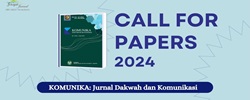METODOLOGI PENAFSIRAN AL-QUR’AN MENURUT FAZLUR RAHMAN
DOI:
https://doi.org/10.24090/komunika.v9i2.852Keywords:
Hermeneutika, al-Qur’anAbstract
Based on anxiety towards stagnation of Islamic thought, Fazlur Rahman attempted to reconstruct the paradigm and methodology of text interpretation that can restore the spirit of progressive Islam that is always actual at anywhere and anytime. To that end, he developed a Qur’anic hermeneutics oriented to understand the text of the Qur’an contextually. Hermeneutics is epistemologically based on his view that the text of the Qur’an is a historical product of Arab society. This thesis does not mean that he asserts the transcendental dimension of the Qur’an, but he would like to affirm that the messages or transcendental values are profaned within the scope of the historicity of the Arab community as its first recipient. Therefore, it is necessary to make a distinction between the universal moral values and historical legal products contained in the text. With this thesis, he offers a model of double movements in the interpretation of the Qur’an. The first movement is that of the present situation to the time of al-Qur’an, while the second movement should start from the principles of the generalized text to contemporary socio-historical reality. Berbasis kegelisahan terhadap kejumudan pemikiran Islam, Fazlur Rahman berupaya merekonstruksi paradigma dan metodologi interpretasi teks yang dipandangnya dapat mengembalikan spirit progresifitas Islam yang selalu aktual di manapun dan kapanpun. Untuk tujuan tersebut, ia mengembangkan hermeneutika al-Qur’an yang berorientasi pada pemahaman teks al-Qur’an secara kontekstual. Hermeneutika ini secara epistemologis berbasis pada pandangannya bahwa teks al-Qur’an merupakan produk historis masyarakat Arab. Tesis ini tidak berarti bahwa ia menegasikan dimensi transendentalal-Qur’an, namun ia ingin menegaskan bahwa pesan-pesan atau nilainilai transendental diprofankan dalam lingkup historisitas masyarakat Arab sebagai penerima pertamanya. Oleh karena itu, perlu adanya pembedaan antara nilai-nilai moral yang bersifat universal dan produk legal historis yang terdapat dalam teks tersebut. Dengan tesis ini, ia menawarkan model  double movement (gerakan ganda) dalam menafsirkan al-Qur’an. Gerakan pertama yakni dari situasi sekarang ke masa al-Qur’an. Sementara gerakan yang kedua berangkat dari prinsip-prinsip yang digeneralisasikan dari teks ke realitas sosio-historis kontemporer.References
Abdurrahman, Moeslim. Islam sebagai Kritik Sosial. Jakarta: Erlangga, 2003.
Abu Zayd, Nasr Hamid, Mafhu>m an-Nas}: Dira>sah fi> ‘Ulu>m al-Qur’a>n. Beirut: al-Markaz as-Saqafi al-‘Arabi, 1994.
Amal, Taufik Adnan. Rekonstruksi Sejarah al-Qur’an. Jakarta: Pustaka Alvabet, 2005.
Essack, Farid. Qur’an, Liberation & Pluralism: an Islamic Perspectives of Interreligious Solidarity Against Oppression. England: Oneworld, 1977.
Gracia, Jorge J.E. A Theory of Textuality. Albany: Sate University of New York Press, 1995.
Hidayat, Komaruddin. Memahami Bahasa Agama. Jakarta: Paramadina, 1996.
Izutsu, Toshihiko. Relasi Tuhan dan Manusia. Yogyakarta: Tiara Wacana, 1997.
Karim, Khalil Abdul. Hegemoni Quraisy: Agama, Budaya, Kekuasaan. Yogyakarta: LKiS, 2002.
_____, Syari’ah: Sejarah Perkelahian Pemaknaan. Yogyakarta: LKiS, 2003.
Muhammad, Husein. Islam: Agama Ramah Perempuan. Yogyakarta: LKiS, 2004.
Rahman, Fazlur. Islam & Modernity: Transformation of an Intelectual Tradition. Chicago & London: the University of Chicago Press, 1982.
_____, Tema-tema Pokok Al-Qur’an. Bandung: Pustaka, 1996.
_____, Islam. Bandung: Pusaka, 2000.
Saeed, Abdullah. Interpreting the Qur’an: Towards a Contemporary Approach. London & New York: Routledge, 2006.
Schleiermacher, Friedrich. Hermeneutics and Criticism and Other Writings. New York: Cambridge University Press, 1998.
Setiawan, M. Nur Kholis. Al-Qur’an Kitab Sastra Terbesar. Yogyakarta: eLSAQ, 2006.
Shihab, M. Quraish. Mukjizat al-Qur’an. Jakarta: Mizan, 1997.
Smith, Wilfred Cantwell. The Meaning and End of Religion. Minneapolis: Fortress Press, 1991.
Abu Zayd, Nasr Hamid, Mafhu>m an-Nas}: Dira>sah fi> ‘Ulu>m al-Qur’a>n. Beirut: al-Markaz as-Saqafi al-‘Arabi, 1994.
Amal, Taufik Adnan. Rekonstruksi Sejarah al-Qur’an. Jakarta: Pustaka Alvabet, 2005.
Essack, Farid. Qur’an, Liberation & Pluralism: an Islamic Perspectives of Interreligious Solidarity Against Oppression. England: Oneworld, 1977.
Gracia, Jorge J.E. A Theory of Textuality. Albany: Sate University of New York Press, 1995.
Hidayat, Komaruddin. Memahami Bahasa Agama. Jakarta: Paramadina, 1996.
Izutsu, Toshihiko. Relasi Tuhan dan Manusia. Yogyakarta: Tiara Wacana, 1997.
Karim, Khalil Abdul. Hegemoni Quraisy: Agama, Budaya, Kekuasaan. Yogyakarta: LKiS, 2002.
_____, Syari’ah: Sejarah Perkelahian Pemaknaan. Yogyakarta: LKiS, 2003.
Muhammad, Husein. Islam: Agama Ramah Perempuan. Yogyakarta: LKiS, 2004.
Rahman, Fazlur. Islam & Modernity: Transformation of an Intelectual Tradition. Chicago & London: the University of Chicago Press, 1982.
_____, Tema-tema Pokok Al-Qur’an. Bandung: Pustaka, 1996.
_____, Islam. Bandung: Pusaka, 2000.
Saeed, Abdullah. Interpreting the Qur’an: Towards a Contemporary Approach. London & New York: Routledge, 2006.
Schleiermacher, Friedrich. Hermeneutics and Criticism and Other Writings. New York: Cambridge University Press, 1998.
Setiawan, M. Nur Kholis. Al-Qur’an Kitab Sastra Terbesar. Yogyakarta: eLSAQ, 2006.
Shihab, M. Quraish. Mukjizat al-Qur’an. Jakarta: Mizan, 1997.
Smith, Wilfred Cantwell. The Meaning and End of Religion. Minneapolis: Fortress Press, 1991.
Downloads
Published
2017-01-26
How to Cite
Munfarida, E. (2017). METODOLOGI PENAFSIRAN AL-QUR’AN MENURUT FAZLUR RAHMAN. KOMUNIKA: Jurnal Dakwah Dan Komunikasi, 9(2), 243–257. https://doi.org/10.24090/komunika.v9i2.852
Issue
Section
Articles
License
Authors who publish with this journal agree to the following terms:
- Authors retain copyright and grant the journal right of first publication with the work simultaneously licensed under a Creative Commons Attribution-ShareAlike 4.0 International License that allows others to share the work with an acknowledgement of the work's authorship and initial publication in this journal.
- Authors are able to enter into separate, additional contractual arrangements for the non-exclusive distribution of the journal's published version of the work (e.g., post it to an institutional repository or publish it in a book), with an acknowledgement of its initial publication in this journal.
- Authors are permitted and encouraged to post their work online (e.g., in institutional repositories or on their website) prior to and during the submission process, as it can lead to productive exchanges, as well as earlier and greater citation of published work (See The Effect of Open Access).





















